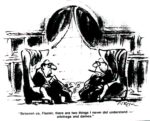This is Chapter 9 in my book: Ellerman, David. 1995. Intellectual Trespassing as a Way of Life: Essays in Philosophy, Economics, and Mathematics. Lanham MD: Rowman & Littlefield.
This essay grew out of an attempt to model mathematically the possible cross-ownership arrangements that might arise between privatizing firms in the former Yugoslavia [see Ellerman 1991]. The cross-ownership arrangements resemble the groups of Japanese companies called keiretsu. There is cross ownership between the companies in the group as well as some ownership outside the group that is traded on the stock market. In spite of the partial outside ownership, the keiretsu often behave as “self-owning” groups. If firm A owns shares in B, then the management in A usually signs over its proxy on shares in B to the management in firm B. And the management in B does likewise with respect to the managers in A. Thus within certain constraints, each firm can act like a “self-owning” firm, not totally unlike the self-managing firms of the former Yugoslavia.





